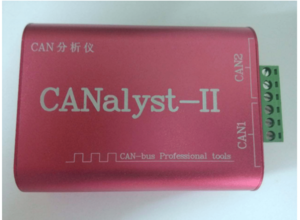Check out my first novel, midnight's simulacra!
CANalyst II

The Canalyst II is an affordable, well-built piece of very Chinese equipment, exposing two CAN bus bus transceivers to a USB CAN adapter capable of 7k fps, and megabit CAN networks. There is very little English documentation. It appears as USB VendorID 04d8, ProductID 0053 (04d8:0053), the space of Microchip Technology, Inc.. Both channels come equipped with independently-selectable 120Ω resistors necessary for ISO 11898-2 High-Speed CAN buses (such a resistor should not be used with ISO 11898-3 Reliable CAN buses).
Linux

The Linux kernel's preferred way to drive CAN adapters is via SocketCAN, which presents the device as a network interface. There does not appear to be a SocketCAN driver for the Canalyst II as of 2019-06-10. The mcba_usb driver, recompiled to use the Canalyst II's USB ID, definitely does *not* work. I'm planning to write a kernel driver; the GitHub project is CanalystII-SocketCAN. The python-can project contains a userspace driver, for which I've recently submitted patches (it wasn't working when my Canalyst II arrived). This allows a Python program to use the device, which is nice, I guess.
If the usbserial kernel module is told to use the Canalyst II's USB IDs via sudo modprobe usbserial vendor=0x04d8 product=0x0053, it does appear to successfully bring up an SLCAN device, which can then be exposed as a network device using slcand or slcan_attach. The usbserial module will create 6(!) ttyUSB nodes for the CANalyst II. Only the first device seems to have any effect when used with SLCAN. To create a 125Kbps adapter, use something like:
[schwarzgerat](0) $ sudo slcand -o -s4 -F ttyUSB0 [6] starting on TTY device /dev/ttyUSB0 [5] attached TTY /dev/ttyUSB0 to netdevice slcan0
The generated net device cannot have its bitrate set using ip, like native SocketCAN devices. Instead, the -s argument must be provided to slcand, using the following table:
| ASCII Command | CAN Bitrate |
|---|---|
| s0 | 10 Kbit/s |
| s1 | 20 Kbit/s |
| s2 | 50 Kbit/s |
| s3 | 100 Kbit/s |
| s4 | 125 Kbit/s |
| s5 | 250 Kbit/s |
| s6 | 500 Kbit/s |
| s7 | 800 Kbit/s |
| s8 | 1000 Kbit/s |
lsusb output
usbutils 010, kernel 5.1.8, systemd 241.
Bus 001 Device 029: ID 04d8:0053 Microchip Technology, Inc.
Device Descriptor:
bLength 18
bDescriptorType 1
bcdUSB 2.00
bDeviceClass 0
bDeviceSubClass 0
bDeviceProtocol 0
bMaxPacketSize0 8
idVendor 0x04d8 Microchip Technology, Inc.
idProduct 0x0053
bcdDevice 3.24
iManufacturer 1 Microchip Technology Inc.
iProduct 3 Chuangxin Tech USBCAN/CANalyst-II
iSerial 0
bNumConfigurations 1
Configuration Descriptor:
bLength 9
bDescriptorType 2
wTotalLength 0x0066
bNumInterfaces 1
bConfigurationValue 1
iConfiguration 0
bmAttributes 0xc0
Self Powered
MaxPower 500mA
Interface Descriptor:
bLength 9
bDescriptorType 4
bInterfaceNumber 0
bAlternateSetting 0
bNumEndpoints 12
bInterfaceClass 255 Vendor Specific Class
bInterfaceSubClass 255 Vendor Specific Subclass
bInterfaceProtocol 255 Vendor Specific Protocol
iInterface 0
Endpoint Descriptor:
bLength 7
bDescriptorType 5
bEndpointAddress 0x01 EP 1 OUT
bmAttributes 2
Transfer Type Bulk
Synch Type None
Usage Type Data
wMaxPacketSize 0x0040 1x 64 bytes
bInterval 1
Endpoint Descriptor:
bLength 7
bDescriptorType 5
bEndpointAddress 0x81 EP 1 IN
bmAttributes 2
Transfer Type Bulk
Synch Type None
Usage Type Data
wMaxPacketSize 0x0040 1x 64 bytes
bInterval 1
Endpoint Descriptor:
bLength 7
bDescriptorType 5
bEndpointAddress 0x02 EP 2 OUT
bmAttributes 2
Transfer Type Bulk
Synch Type None
Usage Type Data
wMaxPacketSize 0x0040 1x 64 bytes
bInterval 1
Endpoint Descriptor:
bLength 7
bDescriptorType 5
bEndpointAddress 0x82 EP 2 IN
bmAttributes 2
Transfer Type Bulk
Synch Type None
Usage Type Data
wMaxPacketSize 0x0040 1x 64 bytes
bInterval 1
Endpoint Descriptor:
bLength 7
bDescriptorType 5
bEndpointAddress 0x03 EP 3 OUT
bmAttributes 2
Transfer Type Bulk
Synch Type None
Usage Type Data
wMaxPacketSize 0x0040 1x 64 bytes
bInterval 1
Endpoint Descriptor:
bLength 7
bDescriptorType 5
bEndpointAddress 0x83 EP 3 IN
bmAttributes 2
Transfer Type Bulk
Synch Type None
Usage Type Data
wMaxPacketSize 0x0040 1x 64 bytes
bInterval 1
Endpoint Descriptor:
bLength 7
bDescriptorType 5
bEndpointAddress 0x04 EP 4 OUT
bmAttributes 2
Transfer Type Bulk
Synch Type None
Usage Type Data
wMaxPacketSize 0x0040 1x 64 bytes
bInterval 1
Endpoint Descriptor:
bLength 7
bDescriptorType 5
bEndpointAddress 0x84 EP 4 IN
bmAttributes 2
Transfer Type Bulk
Synch Type None
Usage Type Data
wMaxPacketSize 0x0040 1x 64 bytes
bInterval 1
Endpoint Descriptor:
bLength 7
bDescriptorType 5
bEndpointAddress 0x05 EP 5 OUT
bmAttributes 2
Transfer Type Bulk
Synch Type None
Usage Type Data
wMaxPacketSize 0x0040 1x 64 bytes
bInterval 1
Endpoint Descriptor:
bLength 7
bDescriptorType 5
bEndpointAddress 0x85 EP 5 IN
bmAttributes 2
Transfer Type Bulk
Synch Type None
Usage Type Data
wMaxPacketSize 0x0040 1x 64 bytes
bInterval 1
Endpoint Descriptor:
bLength 7
bDescriptorType 5
bEndpointAddress 0x06 EP 6 OUT
bmAttributes 2
Transfer Type Bulk
Synch Type None
Usage Type Data
wMaxPacketSize 0x0040 1x 64 bytes
bInterval 1
Endpoint Descriptor:
bLength 7
bDescriptorType 5
bEndpointAddress 0x86 EP 6 IN
bmAttributes 2
Transfer Type Bulk
Synch Type None
Usage Type Data
wMaxPacketSize 0x0040 1x 64 bytes
bInterval 1
can't get device qualifier: Resource temporarily unavailable
can't get debug descriptor: Resource temporarily unavailable
Device Status: 0x0001
Self Powered